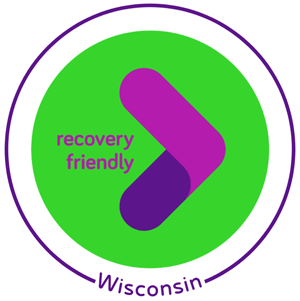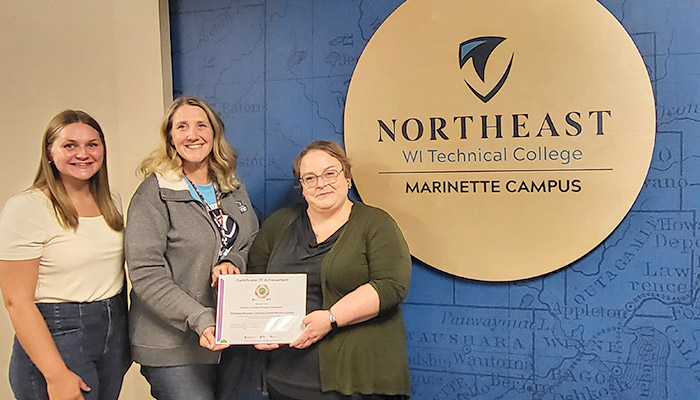Recovery Friendly Workplaces in Marinette County
- Need: To reduce barriers to employment for people in substance use recovery in Marinette County, Wisconsin.
- Intervention: An initiative in which community members in recovery train local employers in recovery friendly workplace guidelines and provide recovery coaching to employees.
- Results: One business in Marinette County has been fully trained, and more than 50 people in recovery have been referred to the Wisconsin Department of Workforce Development's Worker Connection Program in the program's first year.
Description
Biehl Bridges to Recovery, a peer-run substance use recovery center in rural Marinette County, Wisconsin, had noticed that employment was one of the biggest challenges facing people in the local recovery community. Local employers were often hesitant to hire people in recovery, and did not offer a sustainable workplace environment for people in recovery. To address these barriers, Biehl Bridges to Recovery partnered with the University of Wisconsin Division of Extension's Health & Well-Being Institute to develop a Recovery Friendly Workplaces (RFW) model to serve Marinette County.

Recovery Friendly Workplaces in Marinette County differs from other RFW programs around the country in several ways. While it will work with any local workplace, it focuses primarily on the manufacturing industry, which is the biggest employment sector in Marinette County. Training is also led by people in recovery, along with a local county extension educator. While developing the program, founders conducted focus groups with people in recovery, health care providers, and local employers to more effectively meet local needs.
The Wisconsin Partnership Program at the University of Wisconsin School of Medicine and Public Health began funding the project in December 2022 and will continue to provide funding until December 2025.
Services offered
Recovery Friendly Workplaces in Marinette County's services are twofold: the program trains local businesses in hiring and employing people in recovery, while also providing peer recovery coaching for people in recovery to help them succeed as employees. People in recovery lead both of these efforts.
For employers, the program offers both in-person trainings and a RFW toolkit, which includes best practices for supporting employees with substance use disorders and in recovery. The toolkit was developed by program leaders and customized to Marinette County after meetings with local stakeholders and people in recovery. It is available to download for free on the program website. Once the program knows that a workplace is recovery-friendly, it will refer people in recovery to them as employees.
For people in recovery, the program offers peer-led coaching. Any person who walks into Biehl Bridges to Recovery receives an assessment by a case manager and is then assigned to a recovery coach as needed. If employment is identified as an area of need in the initial assessment, the coach will work with that person to connect them with a recovery-friendly employer and support them as an employee.
Results
One business in Marinette County has been fully trained as of October 2024, with at least five others in progress. The RFW program referred 52 people in recovery to the Wisconsin Department of Workforce Development's Worker Connection Program in the first year of the grant; 50 of those people successfully completed enrollment in the Worker Connection Program.

In its first year, the program held 45 meetings and events related to the initiative, including regular team meetings, advisory board meetings, focus group gatherings, Chamber of Commerce and other community organization events, and meetings with national and state stakeholders. Multiple other counties in Wisconsin have reached out to Marinette County to inquire about replicating the RFW program in their own communities.
Challenges
Implementing the program – including lining up technical assistance and making sure the proper procedures are in place – took a bit longer than program leaders expected.
Stigma around substance use and recovery also led to misconceptions about the program among some local employers, which presented challenges for program leaders and drove home the importance of clear communication when describing the program and its goals.
Replication
Partnerships have been crucial in getting the RFW program off the ground and implementing it in Marinette County. The program has worked closely with the Marinette Menominee Area Chamber of Commerce and other partners to build connections with employers and community members.
Program leaders also recommend using national models and resources that already exist as a base when building a program in a rural community, then personalizing that foundation to fit the community. They stress that local programs don't need to "reinvent the wheel." Marinette County RFW program leaders spent six to nine months meeting with RFW programs in other states to learn best practices, which they then adapted to better fit the needs of Wisconsin and the Marinette County area.
Lastly, program leaders emphasize the importance of giving people in recovery a seat at the table and working with local recovery community organizations when possible.
Contact Information
Jennifer Park-Mroch, PhD, Health & Well-Being State SpecialistUniversity of Wisconsin-Madison, Division of Extension – Health & Well-Being Institute
Recovery Friendly Workplaces in Marinette County
jennifer.parkmroch@wisc.edu
Topics
Community and economic development
· Community and faith-based initiatives
· Stigma
· Substance use and misuse
States served
Wisconsin
Date added
November 19, 2024
Suggested citation: Rural Health Information Hub, 2024 . Recovery Friendly Workplaces in Marinette County [online]. Rural Health Information Hub. Available at: https://www.ruralhealthinfo.org/project-examples/1147 [Accessed 18 December 2025]
Please contact the models and innovations contact directly for the most complete and current information about this program. Summaries of models and innovations are provided by RHIhub for your convenience. The programs described are not endorsed by RHIhub or by the Federal Office of Rural Health Policy. Each rural community should consider whether a particular project or approach is a good match for their community’s needs and capacity. While it is sometimes possible to adapt program components to match your resources, keep in mind that changes to the program design may impact results.
